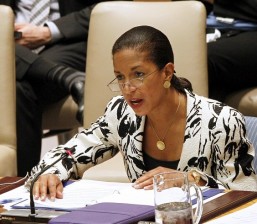UNITED NATIONS — The U.N. Security Council warned Friday of the “changing nature and character” of international terrorism, with terror groups increasingly coordinating with organized crime and resorting to kidnapping for ransom to finance their activities.
The council also expressed concern about the growing use of the internet and new communications technologies to recruit, incite, finance and prepare terrorist activities, according to a presidential statement approved by all 15 council members after an open meeting on fighting terrorism.
U.S. Ambassador Susan Rice said the meeting was especially timely, coming a year after the death of Osama bin Laden.
“His death was an important milestone in the fight against al-Qaida and other terrorist groups, but it did not remove the scourge of terrorism from our world,” she said. “Though al-Qaida has experienced major setbacks, its affiliates and other violent extremist groups continue to operate and pose significant threats.”
She said al-Qaida in the Arabian Peninsula has expanded its reach in Yemen and is looking to launch attacks abroad, while al-Shabab militants in Somalia continue to destabilize the Horn of Africa and militants from the radical Islamist sect Boko Haram perpetrate widespread attacks in Nigeria including against U.N. personnel.
Rice noted that some terrorist groups have become “criminal enterprises in their own right” like Al-Qaida in the Islamic Maghreb in northwest Africa which “has created an environment of fear and instability by adopting, kidnapping for ransom to finance its terrorist operations.”
The Security Council statement warned of an increase in some parts of the world of “incidents of kidnapping and hostage-taking by terrorist groups with the aim of raising funds or gaining political concessions.”
It noted “the changing nature and character of terrorism, with continuing terrorist attacks around the world” and expressed “concern regarding the increasing connection, in many cases, between terrorism and transnational organized crime.”
At the meeting, U.N. Secretary-General Ban Ki-moon said “terrorist organizations continue to look for new havens, adopt new tactics and seek new targets.”
“Collective efforts have disrupted attacks and disabled terrorist networks,” he added. “But recent attacks in Afghanistan, Iraq, Nigeria and Yemen demonstrate that the threat is still formidable.”
Ban urged the international community to focus special attention on conditions conducive to spreading terrorism, citing the example of the Sahel region of sub-Saharan Africa where instability has deepened and violence has increased in part as fallout from the Libyan revolution that toppled Moammar Gadhafi last year.
The secretary-general called on all countries to pursue a coordinated response to terrorism that includes countering its appeal, promoting the peaceful resolution of differences, providing education and job opportunities and promoting economic development.
Ban expressed hope that the 193 U.N. member states will create a U.N. Counterterrorism Coordinator to promote better collaboration.
The Security Council called for urgent additional efforts at the national, regional and international levels “to prevent the illicit proliferation of all arms and related material of all types,” including shoulder-fired surface-to-air missiles. It also urged improved sharing of terrorism-related information.
